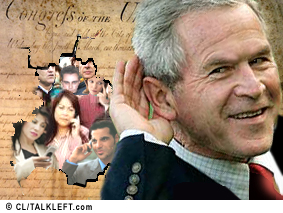Federal Judge Rules Against Bush on Wiretapping

A federal judge in California Wednesday ruled that Bush's warrantless electronic surveillance runs afoul of FISA:
“Congress appears clearly to have intended to — and did — establish the exclusive means for foreign intelligence activities to be conducted,” the judge wrote. “Whatever power the executive may otherwise have had in this regard, FISA limits the power of the executive branch to conduct such activities and it limits the executive branch’s authority to assert the state secrets privilege in response to challenges to the legality of its foreign intelligence surveillance activities.”
Judge Walker’s voice carries extra weight because all the lawsuits involving telephone companies that took part in the N.S.A. program have been consolidated and are being heard in his court.
The opinion is here (pdf). [More...]
| < Hostage Rescue in Colombia | Obama Opposes Ban on Gay Marriage > |



